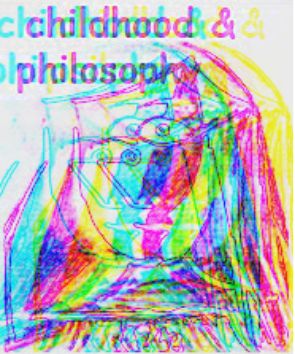movements and effects of the word: a reflection on the narratives of/about children in the school context
DOI:
https://doi.org/10.12957/childphilo.2024.85862Abstract
School is a place where children share a space and time with their peers, other people who make up their daily lives and, sometimes, researchers who go into the field with their investigations. For the production of this article, we used as our base material the field report developed during a workshop held with children in the first year of elementary school enrolled in a public school located in the northern zone of the city of Rio de Janeiro. Based on the speeches, non-speeches and other forms of expression carried out by the students, teacher and researchers, we sought to understand the place of words in the elaboration of narratives by and about children in the school context. In addition to authors from the field of childhood studies, we relied on literary and poetic texts because they provide elements that allow us to situate ourselves in the world from different perspectives. As an exercise in reflection on the movements and effects of these words, we have outlined three lines of analysis: the word that yearns for a gap and to be heard; the imposed, poorly addressed, limiting words and, finally, the invented narratives that turn upside down. In addition to provoking educators to look at their pedagogical practices and mediations, we challenge ourselves to think about whether there is room in school for free and creative expression, which forms readings of self and life.
Downloads
References
Alves, R. Escutatória. In: Alves, R. O amor que acende a lua. Campinas, SP: Papirus, 2003. p. 65-71.
Arendt, H. Entre o passado e o futuro. São Paulo: Perspectiva, 2007.
Bakhtin, M. Estética da criação verbal. São Paulo: Martins Fontes, 2003.
Barros, M. Exercícios de ser criança. Rio de Janeiro: Salamandra, 1999.
Bondía, J. Notas sobre a experiência e o saber de experiência. Revista Brasileira de Educação, n. 19, p. 20-28, 2002. https://doi.org/10.1590/S1413-24782002000100003
Brougère, G. Brinquedo e cultura. São Paulo: Cortez, 1995.
Burman, E. Criança como método como um recurso para interrogar crises, antagonismos e agências. Estudos e Pesquisas em Psicologia, v. 22, n. 4, p. 1296-1312, 2022. https://doi.org/10.12957/epp.2022.71743
Byrne, R. Este livro comeu meu cão. São Paulo: Panda Books, 2015.
Carvalho, M. P. Ensino, uma atividade relacional. Revista Brasileira de Educação, n. 11, p. 17-32, 1999. http://educa.fcc.org.br/scielo.php?script=sci_arttext&pid=S1413-24781999000200003
Castro, L. A subjetividade sob dominação: um diálogo entre ‘the intimate enemy’ de Nandy e ‘nervous conditions’ de Dangarembga. Psicologia Política, v. 19, n. 46, p. 646-663, 2019. http://pepsic.bvsalud.org/pdf/rpp/v19n46/v19n46a19.pdf
Corsaro, W. A. Sociologia da infância. Porto Alegre: Artmed, 2011.
Evaristo, C. A gente combinamos de não morrer. In: EVARISTO, C. Olhos d’água. Rio de Janeiro: Pallas, 2016. p. 99-109.
Freud, S. Escritores criativos e devaneios (1908). In: FREUD, S. Obras Completas. Rio de Janeiro: Imago, 1976. p. 79-85.
Girardello, G. Crianças inventando mundos e a si mesmas: ideias para pensar a autoria narrativa infantil. childhood & philosophy, v. 14, n. 29, p. 71-92, 2018. https://doi.org/10.12957/childphilo.2018.30576
Kohan, W. O. A infância da educação: o conceito devir-criança. Revista Educação Pública, v. 2, n. 1, 2005. https://educacaopublica.cecierj.edu.br/artigos/2/1/a-infancia-da-educacao-o-conceito-devir-crianca
Liebel, M. Infancias dignas, o cómo descolonizarse. Peru: IFEJANT, 2019.
Macedo, N. M. R. et al. Encontrar, compartilhar e transformar: reflexões sobre a pesquisa-intervenção com crianças. In: Pereira, R. M. R.; Macedo, N. M. R. (Orgs.). Infância em pesquisa. Rio de Janeiro: Nau, 2012. p. 87-107
Montes, G. La frontera indómita. In: G. Montes. En torno a la construcción y defensa del espacio poético (s./p.). México: FCE, 1999.
Montes, G. El corral de la infancia. Buenos Aires: Secretaría de la Educación Pública, 2002
Olarieta, B. F. O sol e as laranjas. ou sobre o lugar onde as crianças e a poesia se encontram. Childhood & Philosophy, v. 9, n. 17, p. 11-23, 2013. https://www.e-publicacoes.uerj.br/childhood/article/view/20666/14993.
Olarieta, B. F. Filosofar com as crianças: um trabalho sobre o excesso das palavras. childhood & philosophy, v. 13, n. 26, p. 21-34, 2017. 10.12957/childphilo.2017.26655
Pereira, R. M. R.; Gomes, L. O.; Silva, C. F. S. A infância no fio da navalha: construção teórica como agir ético. ETD – Educação Temática Digital, v. 20, n. 3, p. 761-780, 2018. 10.20396/etd.v20i3.8649227
Ricoeur, P. Tempo e narrativa. In: RICOEUR, P. A configuração do tempo na narrativa de ficção. São Paulo: Martins Fontes, 2011.
Rocha, R. Marcelo, Marmelo, Martelo. São Paulo: Moderna, 1999.
Rockwell, E. Los niños en los intersticios de la cotidianeidad escolar: ¿resistencia, apropiación o subversión? In: Arata, N.; Escalante, J. C.; Padawer, A. (Orgs.). Vivir entre escuelas: relatos y presencias. Antología esencial. Buenos Aires: CLACSO, 2018. p. 239-264.
Rufino, L. Pedagogia das encruzilhadas. Rio de Janeiro: Mórula, 2019.
Rufino, L. Ponta-cabeça: educação, jogo de corpo e outras mandingas. Rio de Janeiro: Mórula, 2023.
Silva, C. F. S.; Gomes, L. O. Participação política e infância: como as crianças brasileiras se posicionam e se fazem presentes em seus contextos sociais. Arquivos Analíticos de Políticas Educativas, v. 31, n. 30, 2023. https://doi.org/10.14507/epaa.31.7346
Silva, C. F. S.; Luciano, G. C. O. A pandemia e o “inseto da sorte”: as mudanças e os deslocamentos subjetivos e coletivos realizados pelas crianças. In: Pereira, R. R. M.; Gomes, L. O.; Patrícia, C. (Orgs.). Infância e pandemia sentimentos e utopias de crianças da região metropolitana do Rio de Janeiro. Rio de Janeiro: Nau Editora, 2023. p. 145-164.
Soares, D. As trajetórias possíveis do banzo. São Paulo: Ofícios Terrestres, 2023.




